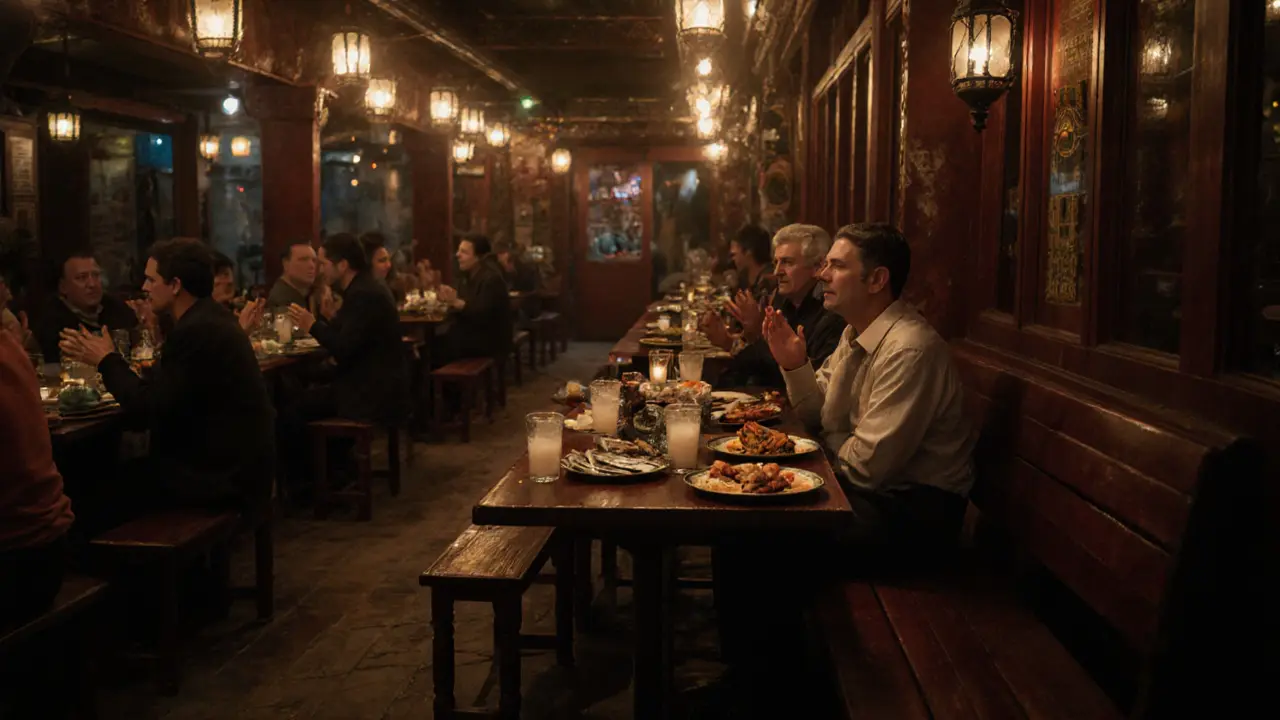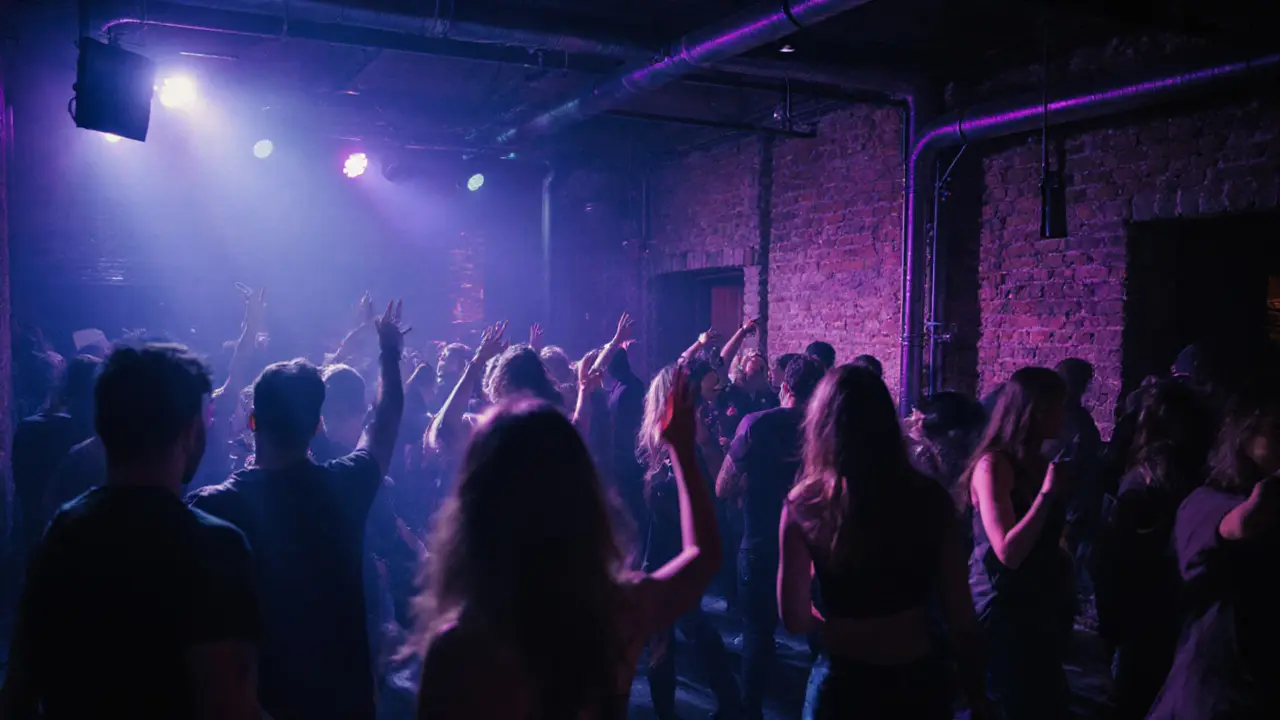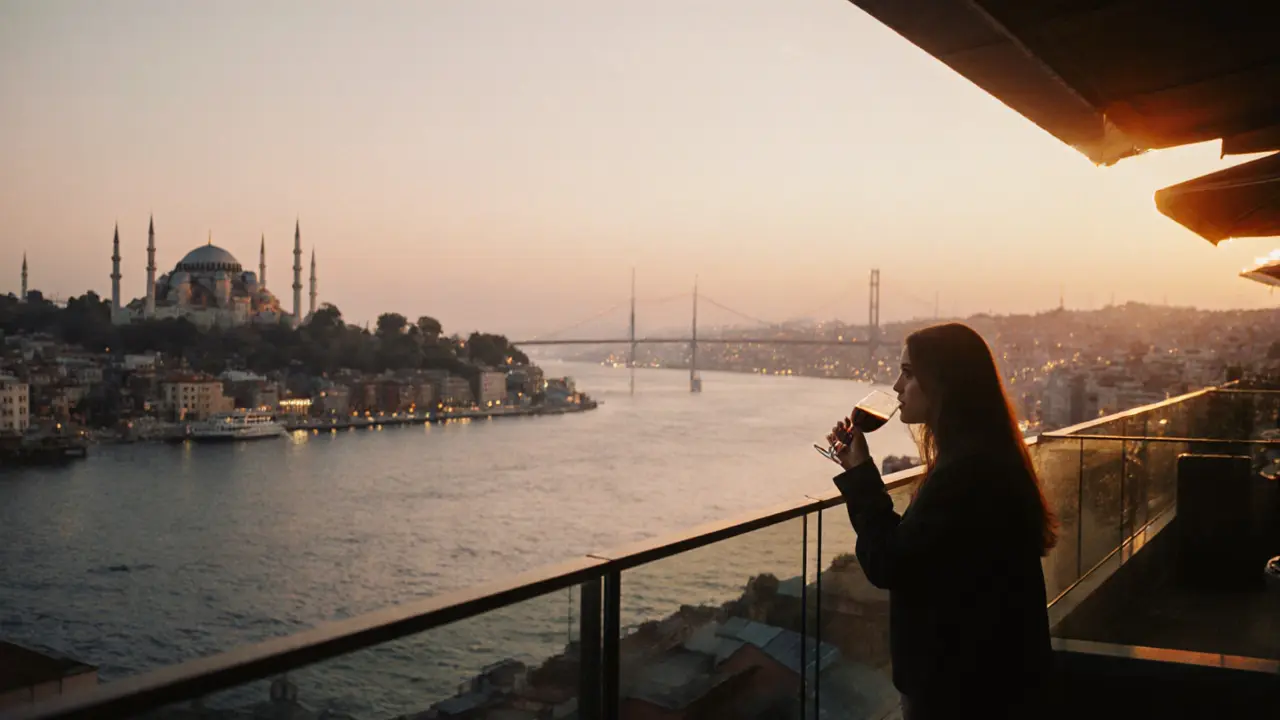
When the sun sets over the Bosphorus, Istanbul doesn’t sleep-it wakes up. The city’s nightlife isn’t just about drinking or dancing. It’s a living mix of centuries-old rituals and modern beats, where the scent of raki mingles with basslines, and old wooden taverns sit right next to neon-lit clubs that don’t close until dawn. If you think Istanbul’s nightlife is all about tourist traps and loud parties, you’re missing the real rhythm of the city.
Where the Past Still Sings: Traditional Taverns and Meyhane Culture
Start your night in Beyoğlu’s backstreets, where meyhane culture has survived wars, revolutions, and trends. These aren’t bars-they’re institutions. Think low wooden benches, flickering lanterns, and waiters carrying trays of meze like dolma, haydari, and grilled sardines. The real magic happens when the bağlama player picks up his instrument. Suddenly, the room falls quiet. Someone starts singing a zeybek, and before you know it, half the table is clapping along, swaying in time.
Places like Çiya Sofrası in Kadıköy or İstanbul Mezeleri in Karaköy don’t just serve food-they serve memory. Locals come here after work, not to get drunk, but to talk, argue, laugh, and remember. The drinks are simple: raki, beer, or wine. The raki is always served with ice and water, turning milky white as it dilutes. It’s not about the alcohol-it’s about the pace. These places move slowly. You don’t rush. You stay until the last note fades.
The Rise of the New Guard: Istanbul’s Underground Club Scene
Fast forward to midnight, and head east toward Kadıköy or across the bridge to Karaköy. This is where Istanbul’s electronic music scene thrives. Unlike the polished clubs of Berlin or London, Istanbul’s best venues feel hidden, almost secretive. You won’t find billboards. You’ll find whispers. A friend texts you a location. You take a taxi. You knock on a door in a nondescript building. Inside? A warehouse turned club, dim lights, walls vibrating with techno or deep house.
Clubs like Bar 66 in Karaköy or Arkaoda in Kadıköy have become pilgrimage sites for music lovers. They don’t book international DJs for the fame-they book them because the sound fits. One night, you might hear a local producer remixing Ottoman folk melodies with analog synths. The next, a Berlin-based artist drops a set that doesn’t end until sunrise. These places don’t care about VIP sections or bottle service. They care about the groove.
Where the Water Meets the Beat: Ortaköy and the Bosphorus Bars
On a warm evening, Ortaköy is where the city breathes. The mosque glows against the water. The bridge lights up in colors. And along the waterfront, bars spill onto the sidewalk. This isn’t just drinking-it’s spectacle. You can sip a craft cocktail while watching a dhow sail past, or dance under string lights as the sound of a live band drifts over the water.
Bars like Bar 1907 and Leb-i Derya mix old-world charm with modern flair. They serve local gin infused with mastic or rose, cocktails made with pomegranate molasses, and small plates of grilled octopus. The crowd? Tourists, artists, students, and expats who’ve lived here long enough to know the best spot isn’t the most crowded one. The real secret? Get there before 9 PM. The later it gets, the louder it becomes-and the more you’ll wish you’d stayed earlier.

Hidden Gems and Local Secrets
Most guidebooks miss the real gems. In the quieter alleys of Cihangir, there’s Çınaraltı, a tiny jazz bar tucked under a tree. No sign. Just a single light above the door. Inside, a pianist plays Bill Evans, and the owner pours homemade plum brandy. In Şişli, Çakır is a 24-hour kebab spot that turns into a late-night hangout for musicians and poets after midnight. You’ll find people arguing about poetry, playing backgammon, or just staring at the ceiling, lost in thought.
Then there’s the rooftop scene. Karaköy Güneş and Asmalı Mescit offer views of the city skyline you won’t find on Instagram. No DJs. No strobe lights. Just a glass of wine, the call to prayer echoing softly in the distance, and the lights of the Golden Horn stretching out below. It’s not loud. But it’s unforgettable.
What to Avoid and What to Expect
Not every place with a neon sign is worth your time. Avoid the tourist traps in Taksim Square’s main drag-overpriced drinks, aggressive waiters, and music that sounds like a Spotify playlist made by someone who’s never been to Istanbul. The real scene isn’t about being seen. It’s about being present.
Expect to pay 15-25 Turkish Lira for a glass of raki in a meyhane. In a club, expect to pay 30-50 Lira for a drink, and 100 Lira for entry if it’s a big night. Cash still rules. Many places don’t take cards. Bring enough. Also, dress casually. You don’t need a suit to get into a good club. In fact, wearing one might make you stand out for the wrong reason.
And remember: Istanbul’s nightlife doesn’t start at midnight. It starts at 10 PM. And it doesn’t end until the sun comes up. People here don’t rush. They savor. Whether it’s the last note of a folk song or the final beat of a techno track, they let it linger.

When to Go and How to Plan
Weekends are busy, especially Friday and Saturday. But if you want the real vibe, go midweek. Wednesday nights at Arkaoda are quieter, the crowd more genuine. Thursday is when local bands play live in small venues. Sunday mornings? Some clubs still have DJs spinning until 8 AM. Walk out into the fresh air, grab a simit from a street vendor, and watch the city slowly come back to life.
Plan ahead, but stay flexible. Many clubs don’t post their lineups online. Ask a local. Ask your hotel staff. Ask someone who’s been here longer than you. They’ll point you to the right door.
Final Thought: It’s Not About the Party
Istanbul’s nightlife isn’t about how many clubs you hit. It’s about how deeply you feel the city’s pulse. One night, you might sit in silence with a stranger in a meyhane, sharing a plate of grilled eggplant. The next, you’re dancing in a basement club with 200 people who all know the same song by heart. Neither is better. Both are Istanbul.
You don’t come here to party. You come here to connect-to history, to music, to people who know how to live slowly, loudly, and beautifully.
Are Istanbul clubs safe for tourists?
Yes, most clubs and bars in Istanbul are safe for tourists, especially in areas like Karaköy, Kadıköy, and Ortaköy. The city has a strong police presence in nightlife zones, and locals are generally helpful. Avoid isolated streets late at night, stick to well-lit areas, and use registered taxis or ride-sharing apps. Don’t leave drinks unattended-this is standard advice everywhere, not just Istanbul.
What’s the best time to visit Istanbul for nightlife?
The best months are April to June and September to November. The weather is mild, the crowds are thinner, and the energy is just right. Summer (July-August) gets packed with tourists, and winter (December-February) can be cold and quiet. But even in winter, the meyhane scene stays alive-just expect fewer people on the streets and more warmth inside.
Do I need to speak Turkish to enjoy Istanbul’s nightlife?
No, but knowing a few phrases helps. Most bartenders and club staff in popular areas speak basic English. In traditional meyhane, staff might not. A simple "Teşekkür ederim" (Thank you) or "Lütfen" (Please) goes a long way. Locals appreciate the effort, and it often leads to better service-or even an invitation to join a table.
Can I find vegan or vegetarian options in Istanbul nightlife spots?
Absolutely. Traditional meyhane menus are full of plant-based dishes: hummus, stuffed peppers, grilled vegetables, lentil soup, and eggplant salads. Many newer bars and clubs now offer vegan cocktails and snacks. Places like Çiya Sofrası and Yasemin in Kadıköy have dedicated vegan sections. Just ask-most places are happy to accommodate.
What’s the legal drinking age in Istanbul?
The legal drinking age in Turkey is 18. You’ll be asked for ID at clubs and some bars, especially if you look under 25. Carry your passport or a government-issued ID. Alcohol sales are banned after 10 PM in some neighborhoods, but this doesn’t apply to bars and clubs that serve alcohol on-site. They can serve until closing.

Write a comment